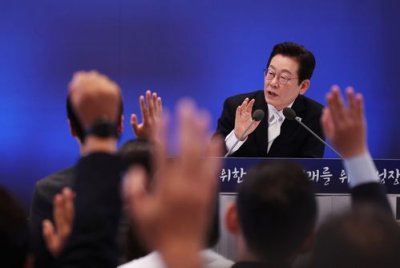South Korean President Lee Jae Myung takes questions during a news conference to mark 100 days in office at the Blue House in Seoul Thursday. Pool Photo by Kim Hong-ji/Reuters/EPA
SEOUL, Sept. 11 (UPI) — South Korean President Lee Jae Myung said Thursday that last week’s “perplexing” immigration raid at a Hyundai electric battery plant in Georgia, which led to the detention of more than 300 South Korean workers, could prevent firms from making future investments in the United States.
“Companies will have to worry about whether establishing a local factory in the United States will be subject to all sorts of disadvantages or difficulties,” Lee said at a press conference in Seoul marking his 100th day in office.
“That could have a significant impact on future direct investment,” he said.
Multiple agencies led by U.S. Immigration and Customs Enforcement arrested 475 people, most of whom are South Korean nationals, at a Hyundai-LG Energy Solutions battery plant near Savannah, Ga., last Thursday.
ICE and Homeland Security Investigations officials said those who were detained are not authorized to work in the United States. The raid was the largest single-site operation so far under U.S. President Donald Trump‘s mass deportation agenda.
The roundup, which came less than two weeks after Lee met with Trump in the White House, has sparked widespread public shock and anger in South Korea. In July, Seoul and Washington reached a trade deal to lower Trump’s threatened tariffs from 25% to 15%, while South Korea pledged to invest $350 billion in the United States.
“The situation is extremely perplexing,” Lee said, noting that South Korean firms regularly send skilled workers for short stays to help establish overseas factories.
“These are not long-term workers,” he said. “When setting up facilities and equipment, you need skilled technicians. You need to install the machinery and the U.S. doesn’t have the workforce locally.”
Lee added that Seoul is currently negotiating with Washington to address the visa situation through potential waivers, additional quotas or new visa categories for Korean workers.
“If the United States sees a practical need, I think the issue will be resolved,” he said. “Under the current circumstances, Korean companies will be very hesitant to make direct investments in the United States.”
Some 316 South Korean nationals and 14 foreigners will return to Seoul on a charter plane departing at 1 a.m. local time on Friday, Lee said.
The flight, initially planned for Wednesday, was delayed due to U.S. officials insisting on transporting the workers in handcuffs, Lee added. He said Seoul protested and Washington reversed its stance, citing an “instruction from the White House.”
